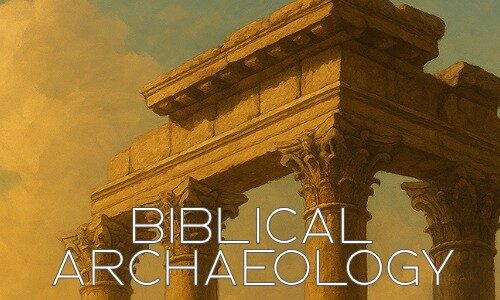This course examines the archaeological discoveries that inform and illuminate the historical and cultural context of the biblical world.
Biblical Archaeology
Level: Master’s
Course Length: 10 weeks (approx. 120–150 hours total if following full module path)
Delivery Mode: Competency-based, self-paced with required final exam
Course Overview
This course explores the field of biblical archaeology, highlighting discoveries that shed light on the historical, cultural, and religious context of the biblical world. Students will learn the principles of archaeology, survey major archaeological sites, and evaluate how findings contribute to biblical interpretation and historical understanding.
The course is competency-based:
-
Students may complete all modules and assignments to prepare for the final exam, or
-
If they already have sufficient knowledge, they may skip directly to the final competency exam.
Competency is demonstrated by integrating archaeological data with biblical studies in historical and theological reflection.
Learning Outcomes
By the end of this course, students will be able to:
-
Define the goals and methods of biblical archaeology.
-
Identify key archaeological sites relevant to the Old and New Testaments.
-
Evaluate the relationship between archaeology and biblical interpretation.
-
Explain how archaeological discoveries illuminate the cultural and historical context of Scripture.
-
Integrate archaeological insights into theological and historical studies.
Weekly Breakdown (10 Weeks)
Week 1: Introduction to Biblical Archaeology (8–10 hours)
-
History and purpose of biblical archaeology.
-
Archaeological methods: excavation, dating techniques, stratigraphy.
-
Competency: Describe the role and limitations of archaeology in biblical studies.
Week 2: The World of the Patriarchs (12–14 hours)
-
Ancient Near Eastern cultures and texts (e.g., Mari tablets, Nuzi documents).
-
Archaeology and the setting of Genesis.
-
Competency: Explain how archaeology contextualizes patriarchal narratives.
Week 3: Egypt and the Exodus (10–12 hours)
-
Egyptian culture and religion.
-
Evidence related to Israel in Egypt and the Exodus debate.
-
Competency: Analyze archaeological data in relation to Exodus narratives.
Week 4: The Conquest and Settlement (12–14 hours)
-
Excavations at Jericho, Ai, Hazor, and other sites.
-
Models of Israel’s emergence in Canaan.
-
Competency: Evaluate archaeological interpretations of Joshua and Judges.
Week 5: The United Monarchy (10–12 hours)
-
Jerusalem in the time of David and Solomon.
-
Finds from Megiddo, Gezer, and Hazor.
-
Competency: Assess evidence for Israel’s monarchy and temple period.
Week 6: The Divided Kingdom & Prophets (12–14 hours)
-
Archaeology of Samaria, Lachish, and northern Israel.
-
Assyrian and Babylonian records of Israel and Judah.
-
Competency: Interpret prophetic messages in light of archaeological evidence.
Week 7: Exile and Return (12–14 hours)
-
Babylonian captivity in archaeology.
-
Persian period sites and inscriptions.
-
Competency: Describe archaeological evidence for post-exilic Judaism.
Week 8: The Intertestamental Period (10–12 hours)
-
Hellenistic influence in Palestine.
-
Dead Sea Scrolls and Qumran community.
-
Competency: Explain archaeology’s contribution to understanding Second Temple Judaism.
Week 9: The World of Jesus and the Early Church (12–14 hours)
-
Galilee, Jerusalem, and Herodian architecture.
-
Inscriptions and artifacts from the Roman period.
-
Competency: Relate archaeology to the Gospels and Acts.
Week 10: Integration & Competency Exam Prep (10–12 hours)
-
Review of key discoveries: Tel Dan stele, Merneptah stele, Dead Sea Scrolls, Pilate inscription.
-
How archaeology confirms, challenges, and enriches biblical study.
-
Practice exam with case studies.
-
Final Competency Exam (required).
Assessment
-
Competency Exam (100%): Students must demonstrate mastery by analyzing case studies where archaeology intersects with Scripture.
-
Optional formative assessments: site reports, reflection essays, and artifact analyses (not required).
Curriculum
- 11 Sections
- 21 Lessons
- 10 Weeks
- Introduction: Faith, Evidence, and DiscoveryFaith, Evidence, and Discovery1
- Week 1: Introduction to Biblical Archaeology (8–10 hours)History and purpose of biblical archaeology. Archaeological methods: excavation, dating techniques, stratigraphy.3
- Week 2: The World of the Patriarchs (12–14 hours)Ancient Near Eastern cultures and texts (e.g., Mari tablets, Nuzi documents). Archaeology and the setting of Genesis.3
- Week 3: Egypt and the Exodus (10–12 hours)3
- Week 4: The Conquest and Settlement (12–14 hours)Excavations at Jericho, Ai, Hazor, and other sites. Models of Israel’s emergence in Canaan.3
- Week 5: The United Monarchy (10–12 hours)Jerusalem in the time of David and Solomon. Finds from Megiddo, Gezer, and Hazor.3
- Week 6: The Divided Kingdom & Prophets (12–14 hours)Archaeology of Samaria, Lachish, and northern Israel. Assyrian and Babylonian records of Israel and Judah.3
- Week 7: Exile and Return (12–14 hours)Babylonian captivity in archaeology. Persian period sites and inscriptions.3
- Week 8: The Intertestamental Period (10–12 hours)Hellenistic influence in Palestine. Dead Sea Scrolls and Qumran community.3
- Week 9: The World of Jesus and the Early Church (12–14 hours)Galilee, Jerusalem, and Herodian architecture. Inscriptions and artifacts from the Roman period.3
- Week 10: Integration & Competency Exam Prep (10–12 hours)3
Instructor

